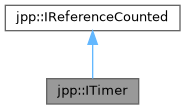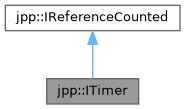 |
Jimcpp 2.1.0
Jimcpp is a high-performance c++ graphics engine.
|
 |
Jimcpp 2.1.0
Jimcpp is a high-performance c++ graphics engine.
|
Interface for getting and manipulating the virtual time. More...
#include <jimcpp/core/engine/ITimer.hpp>


Classes | |
| class | RealTimeDate |
Public Types | |
| enum | EWeekday { EWD_SUNDAY =0 , EWD_MONDAY , EWD_TUESDAY , EWD_WEDNESDAY , EWD_THURSDAY , EWD_FRIDAY , EWD_SATURDAY } |
Public Member Functions | |
| virtual u32 | getRealTime () const =0 |
| Returns current real time in milliseconds of the system. | |
| virtual RealTimeDate | getRealTimeAndDate () const =0 |
| virtual u32 | getTime () const =0 |
| Returns current virtual time in milliseconds. | |
| virtual void | setTime (u32 time)=0 |
| sets current virtual time | |
| virtual void | stop ()=0 |
| Stops the virtual timer. | |
| virtual void | start ()=0 |
| Starts the virtual timer. | |
| virtual void | setSpeed (f32 speed=1.0f)=0 |
| Sets the speed of the timer. | |
| virtual f32 | getSpeed () const =0 |
| Returns current speed of the timer. | |
| virtual bool | isStopped () const =0 |
| Returns if the virtual timer is currently stopped. | |
| virtual void | tick ()=0 |
| Advances the virtual time. | |
 Public Member Functions inherited from jpp::IReferenceCounted Public Member Functions inherited from jpp::IReferenceCounted | |
| IReferenceCounted () | |
| Constructor. | |
| virtual | ~IReferenceCounted () |
| Destructor. | |
| void | grab () const |
| Grabs the object. Increments the reference counter by one. | |
| bool | drop () const |
| Drops the object. Decrements the reference counter by one. | |
| s32 | getReferenceCount () const |
| Get the reference count. | |
| const c8 * | getDebugName () const |
| Returns the debug name of the object. | |
Additional Inherited Members | |
 Protected Member Functions inherited from jpp::IReferenceCounted Protected Member Functions inherited from jpp::IReferenceCounted | |
| void | setDebugName (const c8 *newName) |
| Sets the debug name of the object. | |
Interface for getting and manipulating the virtual time.
|
pure virtual |
Returns current real time in milliseconds of the system.
This value does not start with 0 when the application starts. For example in one implementation the value returned could be the amount of milliseconds which have elapsed since the system was started.
|
pure virtual |
Returns current speed of the timer.
The speed is the factor with which the time is running faster or slower then the real system time.
|
pure virtual |
Returns current virtual time in milliseconds.
This value starts with 0 and can be manipulated using setTime(), stopTimer(), startTimer(), etc. This value depends on the set speed of the timer if the timer is stopped, etc. If you need the system time, use getRealTime()
|
pure virtual |
Sets the speed of the timer.
The speed is the factor with which the time is running faster or slower then the real system time.
|
pure virtual |
|
pure virtual |
|
pure virtual |
Advances the virtual time.
Makes the virtual timer update the time value based on the real time. This is called automatically when calling JimcppDevice::run(), but you can call it manually if you don't use this method.